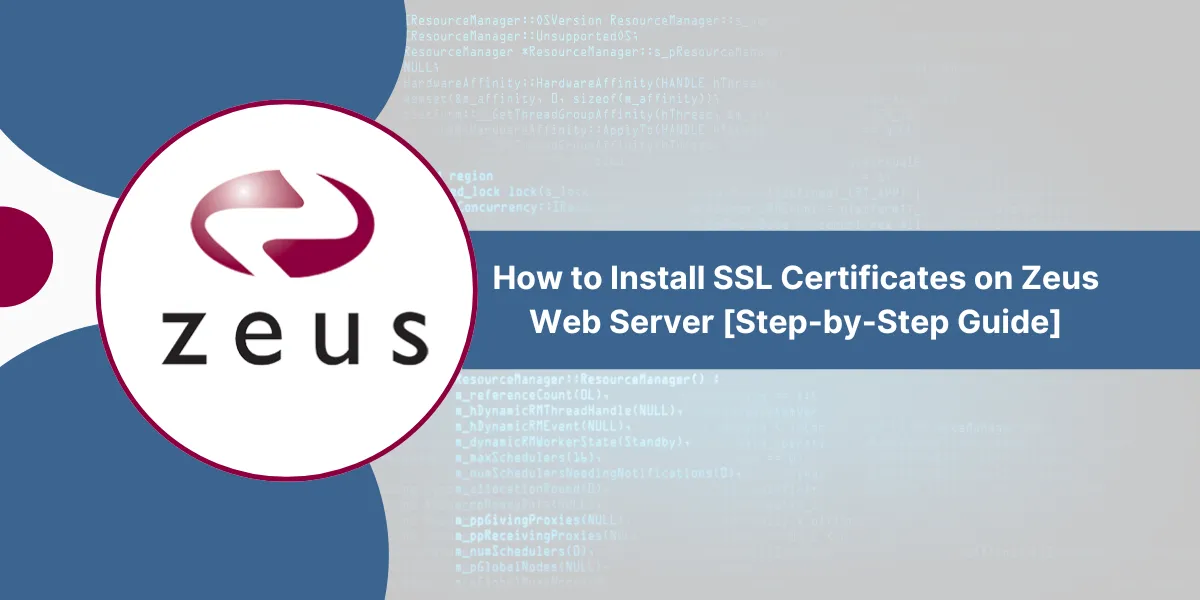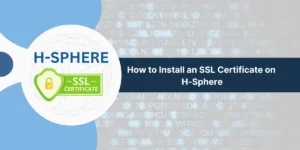What is SSL Certificate Installation on Zeus Web Server?
SSL Certificate Installation on Zeus Web Server is a security setup process that adds encryption to website data transfers. The process of installing an SSL certificate on the Zeus server platform requires certain steps. Users need to generate a Certificate Signing Request (CSR), obtain a valid SSL certificate from a trusted provider, and configure the Zeus server settings.
The installation includes uploading the certificate files, private key configuration, and proper binding of the SSL to the correct domain. This security measure protects sensitive information like passwords, credit card details, and personal data during transmission between servers and browsers.
Prerequisites for Zeus SSL Installation
The following items must be present before beginning SSL installation:
- Administrative access to Zeus Web Server
- SSL certificate files (.crt, .key, .ca-bundle)
- Domain validation completed
- Backup of current Zeus configuration
- Zeus Web Server version 4.0 or higher
How Do I Install SSL Certificate on Zeus Web Server [Step-by-Step Guide]
- Access Zeus Web Server Admin Interface
- Upload Certificate Files
- Configure SSL Settings
- Bind Certificate to Domain
- Test and Apply Configuration
Step 1: Access Zeus Web Server Admin Interface
- Open your web browser and navigate to your Zeus admin panel
- Enter your administrator credentials
- Navigate to SSL Certificates section
- Click Install New Certificate
Step 2: Upload Certificate Files
Required files for upload:
|
File Type |
Extension |
Purpose |
|
Certificate |
.crt |
Your domain’s SSL certificate |
|
Private Key |
.key |
Private key for the certificate |
|
Intermediate |
.ca-bundle |
Certificate authority chain |
Upload process:
- Select Certificate File and upload your .crt file
- Choose Private Key File and upload your .key file
- Upload Intermediate Certificate (.ca-bundle file)
- Verify file sizes match your original certificates
Step 3: Configure SSL Settings
Navigate to the SSL configuration section and set:
- SSL Protocol: TLS 1.2 and TLS 1.3
- Cipher Suites: Strong encryption only
- Certificate Chain: Complete chain verification
- Port Configuration: Port 443 for HTTPS traffic
Step 4: Bind Certificate to Domain
- Select your target domain from the dropdown menu
- Choose the uploaded SSL certificate
- Set Default SSL Certificate if this is your primary domain
- Enable Force HTTPS Redirect for automatic redirection
Step 5: Test and Apply Configuration
- Click Test Configuration to verify settings
- Review any error messages or warnings
- Click Apply Changes to activate the SSL certificate
- Restart Zeus Web Server services when prompted
SSL Configuration File Method
For advanced users, you can configure SSL directly in Zeus configuration files:
# Add to your Zeus virtual server configuration ssl_certificate /path/to/your/certificate.crt ssl_certificate_key /path/to/your/private.key ssl_certificate_chain /path/to/intermediate.ca-bundle # SSL Protocol settings ssl_protocols TLSv1.2 TLSv1.3 ssl_ciphers HIGH:!aNULL:!MD5
What are the Post-Installation Verification Steps of SSL Installation on Zeus Server
Test SSL Certificate Functionality
- Browser Testing: Visit https://yourdomain.com (Check for Tune Icon >> Verify certificate details in browser)
- Online SSL Checkers: Use our free SSL Checker Tool to verify your SSL certificate is properly installed or not on your website/server.
- Command Line Verification:
openssl s_client -connect yourdomain.com:443 -servername yourdomain.com
Monitor SSL Certificate Status
Set up monitoring for:
- Certificate expiration dates (typically 90 days for Let’s Encrypt)
- SSL handshake errors in server logs
- Mixed content warnings
- Certificate chain issues
Can I Renew SSL Certificate on Zeus Web Server?
Yes, you can. Zeus Web Server SSL certificates need to be renewed at regular intervals.
- 30 days before expiration: Start renewal process
- Download new certificate files from the cheap SSL provider
- Follow installation steps with new certificate files
- Test thoroughly before old certificate expires
- Update monitoring systems with new expiration date
Final Thoughts on Wix SSL Setup
The installation of SSL certificates on Zeus Web Server follows a simple procedure which enhances website security. This guide provides complete instructions for proper SSL certificate installation and configuration and ongoing maintenance. The protection of HTTPS depends on regular monitoring and timely renewal for continuous security.
Experienced administrators can complete the entire process in 15-30 minutes to provide immediate security benefits for website visitors and enhance search engine rankings.
FAQs About SSL Installation on Zeus Server
What is a Zeus Web Server SSL certificate?
The Zeus Web Server SSL certificate provides secure data transmission between servers and browsers. The certificate protects sensitive information while proving the website’s authenticity to visitors who access the site.
How do I check if my Zeus Web Server has SSL installed?
Users can check for SSL installation by visiting their website with the ‘https://’ prefix. The browser shows a Tune icon as a sign that SSL functions properly. Users can access certificate details through the server control panel interface.
What are the requirements for installing SSL on Zeus Web Server?
The Zeus Web Server requires three essential components to function: a valid SSL certificate, a private key file that matches the certificate and intermediate certificates obtained from the issuing authority. The server operates on a supported operating system while requiring administrative privileges.
How long does it take to install SSL on Zeus Web Server?
The SSL installation process for Zeus Web Server takes between 15 to 30 minutes to complete. The actual time depends on server configuration and certificate type. The activation process of certificates becomes active immediately after a correct installation.
Can I install multiple SSL certificates on Zeus Web Server?
The Zeus Web Server platform allows multiple SSL certificates to be installed for different domains. Users can establish multiple virtual hosts which require distinct SSL certificates. Each certificate needs its own private key together with specific configuration parameters.
What are common SSL installation errors on Zeus Web Server?
The most common SSL errors stem from file permission problems and private key mismatches as well as incomplete certificate chain configurations. Users typically face installation problems because of configuration syntax mistakes and certificate format compatibility issues.

Priya Mervana
 Verified Web Security Experts
Verified Web Security Experts
Priya Mervana is working at SSLInsights.com as a web security expert with over 10 years of experience writing about encryption, SSL certificates, and online privacy. She aims to make complex security topics easily understandable for everyday internet users.



